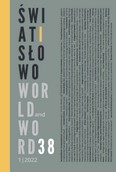Użyteczna wyspa
Useful Island
Author(s): Ireneusz GielataSubject(s): French Literature, Theory of Literature
Published by: Akademia Techniczno-Humanistyczna w Bielsku-Białej
Keywords: Jules Verne’s The Mysterious Island; usefulness; fall; anthropocene;
Summary/Abstract: Jules Verne’s The Mysterious Island, in unanimous opinion of critics, is the most “mysterious” of all the writer’s novels. The article’s author asks questions about what secrets this novel reveals to the contemporary reader who has recently become aware that he lives in the time of “anthropocene marasmus” (E. Bińczyk). He finds answers by confronting the text of Verne’s novel with the views of English utilitarians (J. Bentham, J. S. Mill) and the works of contemporary thinkers (R. Brague, The Kingdom of Man. The Genesis and Failure of the Modern Project, P. Sloterdijk, What Happened in the 20th Century?), and this allowed The Mysterious Island to be considered a prophetic work, another version of a modern story about the fall of man, who, believing in his creative power and the power of instrumental reason, does not see (like the characters of the novel) that the nature he uses marks the end of human agency. This kind of blindness, into which a group of nature colonizers collapse, carrying out their modernist project of “creating of ‘nothing’”, was considered a kind of anthropocene hybris.
Journal: Świat i słowo
- Issue Year: 1/2022
- Issue No: 38
- Page Range: 33-52
- Page Count: 20
- Language: Polish

